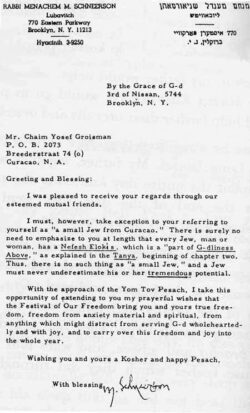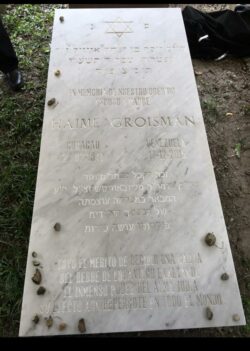This Cozy-Shabbat, in the Shiva week for Rabbi Moshe Kotlarsky, we shared two stories about his globe-trotting missions, people connections and Chabad work on behalf of the Rebbe. These two stories are especially meaningful, and have the Rebbe’s insight and direct involvement.
 On Friday night we shared the Curacao story:
On Friday night we shared the Curacao story:
This story is an old classic, a beloved favorite. You can read Eli Grossman’s brief telling of the story on Chabad.org here: “A Jew in Curacao”. The end of the article has a copy of the Rebbe’s letter to his father, a unique and beautiful letter, also pictured here, with the Rebbe’s message “There is no such thing as a ‘small Jew’ and a Jew must never underestimate his or her potential.”
Years ago at one of the Chabad on Campus conferences at a Shabbos farbrengen I urged Rabbi Kotlarsky to tell the story and he did with much detail.
This is also especially fitting for this Shabbos Parsha Bamidbar, when we read of the census in the opening of the Book of Numbers, whose message is that everyone counts, each and every one is valued and cherished.
 But it was this week on a zoom farbrengen during the Shiva of Rabbi Kotlarsky that I first saw a picture of the gravestone of Mr. Chaim Yosef Grossman (Eli’s father) to whom the Rebbe’s letter was addressed. He passed in2015 and was buried in Venezuela, where he lived and worked after Curacao, and this remarkable inscription is on his gravestone (in both Hebrew and Spanish):
But it was this week on a zoom farbrengen during the Shiva of Rabbi Kotlarsky that I first saw a picture of the gravestone of Mr. Chaim Yosef Grossman (Eli’s father) to whom the Rebbe’s letter was addressed. He passed in2015 and was buried in Venezuela, where he lived and worked after Curacao, and this remarkable inscription is on his gravestone (in both Hebrew and Spanish):
“He merited to receive a letter from the Lubavitcher Rebbe of righteous memory, which explains the tremendous greatness of a Jewish soul, and the publicizing of this letter bore fruit.”
May the message of “No such thing as a small Jew” continue to bear fruit.
On Shabbos Day we told the Rabbi Michelson story:
Rabbi Moshe Kotlarsky frequently traveled all over the world, far and near, as Chabad’s roving ambassador, meeting Jews, finding out communal needs, establishing new Chabad centers in remote and exotic places, doing missions for the Rebbe.
In Guatemala he met a Jewish family, and over the years of his travels and services he became quite close to them. Their daughter met a young man in New York and the wedding was planned around Thanksgiving-time of 1983 and they asked Rabbi Kotlarsky to officiate. So, as rabbis do, he met with the families, and in discussion of family histories it turned out that the groom was a great-nephew of a prominent rabbi in Warsaw, Rabbi Tzvi Yechezkel Michelson, an author of 40+ Jewish books, a learned respected scholar, who later was in the Warsaw Ghetto and perished with his family at Treblinka. Rabbi Kotlarsky knew of this Rabbi Michleson! His own father, R’ Hersh Kotlarsky, who was from Poland, studied in Warsaw and Otwotsk and before the outbreak of WWII he received Semicha from this very same Rabbi Michelson!
So before going to officiate, Rabbi Kotlarsky wrote a note to the Rebbe that he’s going to officiate at this wedding, he knows the family from Guatelmala and that he was excited to learn that the groom is a great-nephew of Rabbi Tzvi Yechezkel Michelson of Warsaw.
The Rebbe went to the Ohel, as he was wont to pray at the gravesite of his father-in-law and would bring people’s letter to him there to pray for them as well. That day he told Rabbi Yehudah Krinsky, of the Rebbe’s secretariat, who also drove the Rebbe to the Ohel, to pass this message along to Rabbi Kotlarsky:
‘I think that he (Rabbi Michelson) attended my wedding, and also gave me a book he had authored, as a gift. The book is in the bookshelf in my office, near the Midrash Tanchuma, close to the light-switch. I will lend the book to you to hold it under the chupah while you officiate at the wedding and say the blessings. The Divine providence of this now becomes apparent – 55 years later!”
It so happens that the November 1983 date of this wedding was on the Hebrew date of 14 Kislev, the Rebbe’s wedding anniversary. The Rebbe’s wedding to Rebbetzin Chaya Mushka was on 14 Kislev 5689/1928, 55 years earlier in Warsaw. And Rabbi Michelson attended, and he gave the Rebbe one of the books he authored as a wedding gift.
Rabbi Kotlarsky took this book along to the wedding. And he told the whole story under the Chuppah. Everyone present felt the impact of this, but none more so than the groom’s father. He remembered Rabbi Michelson. The trauma of the Holocaust affected him deeply. But seeing and hearing this at his own son’s Chuppah was a transformative experience and it uplifted him greatly and allowed him to reconnect and reengage with his heritage.
